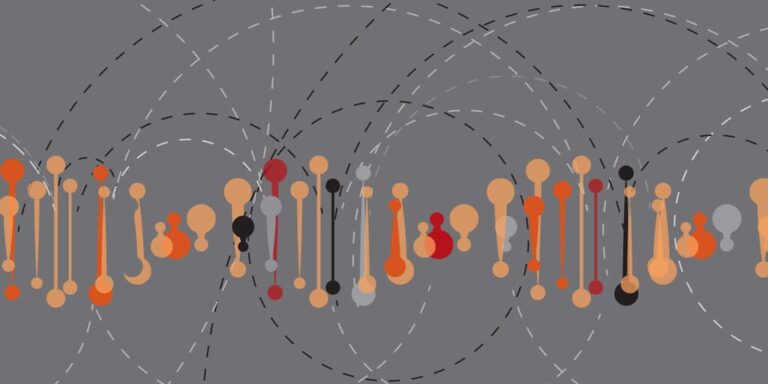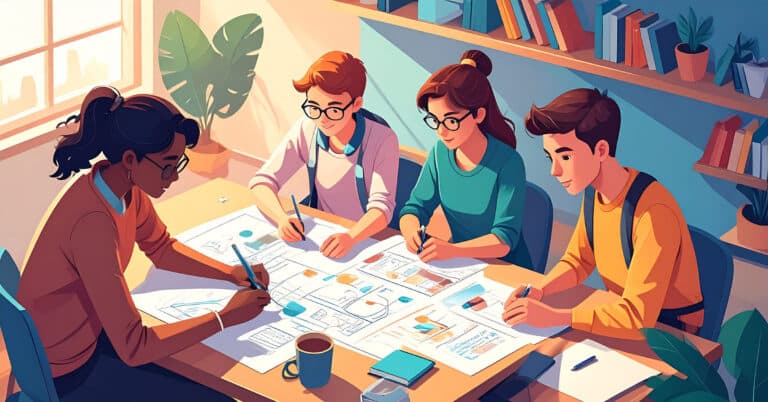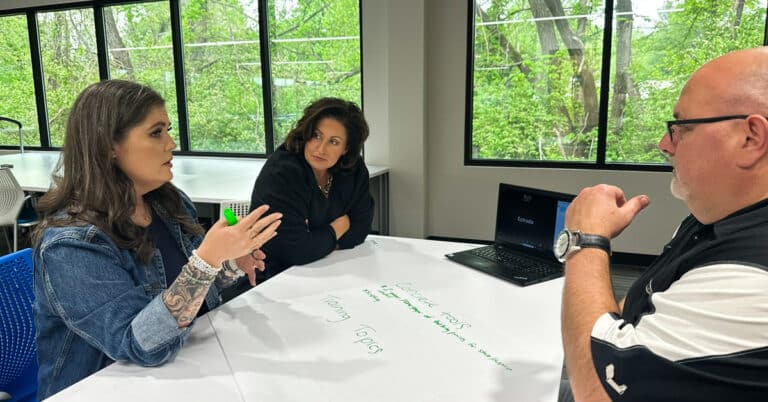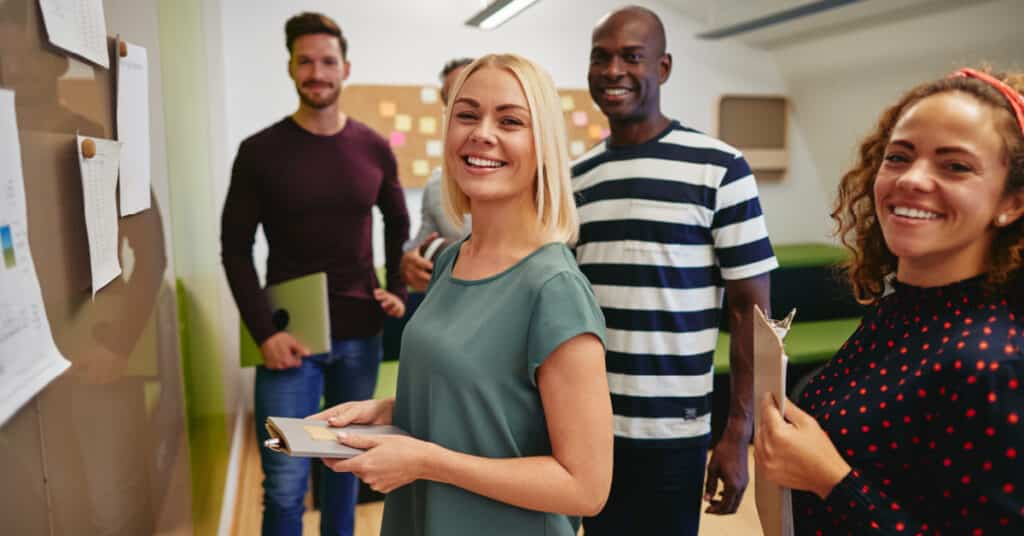
Many educators and school and district administrators implementing personalized, competency-based learning can feel like they’re on an island, trying something new and building out classrooms that don’t look like what we think of when we think of school. That’s why we’re so grateful to help learning communities connect to each other, whether it’s with a neighboring district or across the country.
“You can come to this work with very different whys and still learn something from what others are doing,” said Julianna Charles Brown, senior director of systems transformation with KnowledgeWorks. Brown works with our partners in the Arizona Personalized Learning Network as well as the Nevada Future of Learning network, facilitating the kind of essential relationship-building that makes successfully implementing personalized, competency-based learning possible. “Transforming education systems is deep, long-term work. The power of our national learning community is that partners can see and experience first-hand the different approaches that can sustain this work over time.”
Everywhere we work, from Hawai’i to Michigan, Arizona to South Carolina, Ohio to Texas, we’re privileged to help learning communities uncover and execute on what they want and need education to be for the learners and educators in their communities. And in every case, this includes creating opportunities for them to learn from each other.
“When we started this work in 2010, there were very few games in town,” said Theresa Ewald, former assistant superintendent with Kettle Moraine School District in Wales, Wisconsin. “And it’s lonely when you’re at the cusp, but within a few years we were like, ‘Oh my gosh, there’s people in North Dakota, there’s people in California, there’s people in Missouri and Ohio,’ and that gave us some confidence. We could learn from them, and they could learn from us.”
Ewald is now a personalized learning coach with KnowledgeWorks, a position that allows her to help create the kinds of peer-learning experiences for educators across the country that her staff benefitted from. This kind of peer-to-peer learning can take many shapes: roll-alike groups within a school building or district, professional learning communities, on-site visits, district or state-level convenings or institutes or others. Their purpose, though, is a constant: empowering educators to show and celebrate what they know and what they’re still learning.
The value in aligning your professional development with your vision for teaching and learning
Speak with anyone implementing personalized, competency-based learning, and they’ll tell you that you can’t want something for learners if you don’t want it for educators, too. Many teachers have never experienced personalized learning. Ensuring that they experience it for themselves makes it easier for them to see the value in it for students.
While there is value in bringing in speakers or experts from the field, providing a space for educators to visit the classrooms of their peers and learn from the innovator just down the hall can be incredibly powerful. Five years ago at Yuma Union High School District (YUHSD) in Yuma, Arizona, they built on a foundation of work implementing personalized, competency-based learning and a strong vision for teaching and learning to rethink how they were doing professional development with an annual learning institute.
“Who better to share their best practices and the things that have gone well than those that are in the classroom? The institute has allowed us to build that network amongst ourselves, make those connections,” said Bibi Frazine, director of educational technology and learning management systems with YUHSD. Of the institute, Frazine explains, “our teachers run this entire show.”
Before the institute, there’s a call out to the district for presenters: educators who have something they want to showcase. Educators then have a full day to visit classrooms and observe, and are supported in ongoing professional development through professional learning communities, where they might take something they’ve seen it, apply it and continue to iterate or try something new. Sessions from the institute are also available indefinitely on Canvas, so if an educator isn’t ready to try something yet but grows in their practice, they can return and review when they’re ready to implement.
Derek Bosch, associate superintendent with YUHSD, credits this peer-learning approach as part of the reason why they’ve been so successful in organically growing student-centered practices within the district. Bosch describes the culture at YUHSD as one of risktakers and staff who have grown comfortable being observed, giving and soliciting feedback.
“When teachers are learning from teachers, it creates alignment and transparency of our vision. You’re tipping the scales,” said Bosch. “When you get a bunch of people in the same room, you can see the teacher next to you, what’s working for them. Why can’t it work for me?”
“The credibility lies in the closest person to the children.”
Peer-to-peer learning gets around some of the hesitation educators may have to try something new, because it seems like it’s coming from someone who doesn’t understand what it’s like to be in a classroom or from someone who isn’t working with learners like theirs. Sara Cole, director of special services with Kalispell Public Schools in Kalispell, Montana, along with her colleagues Superintendent Matt Jensen and Assistant Superintendent Peter Fusaro, have made it a priority to expose as many teachers as possible to new classroom practices as demonstrated by other practitioners. Because it isn’t just that educator who benefits, but everyone they’re able to share with when they’re back in their building.
“When it’s the teacher bringing it back to other teachers, it’s the most powerful,” said Cole. “I could come back with ideas, but it would be different than when an educator sees something in a classroom and comes back and presents it. The credibility lies in the closest person to children.”
Cole joined 18 of her peers at the Santa Cruz Valley School District #35 (SCVU35) Personalized, Competency-Based Learning institute in January of 2024. Located in Rio Rico, Arizona, SCVU35 hosts the institute for their educators as well as educators traveling in from around Arizona – or across the nation. Stephen Schadler, assistant superintendent with SCVU35, helped to launch the institute after attending a similar institute in Northern Cass School District #97 in Hunter, North Dakota.
“The greatest value in visiting and observing learning communities is seeing that we’re all practicing. No one’s perfect yet,” said Schadler, who agrees with Cole that it’s critical to bring a cross-section of staff to visit other learning communities to see how this work is done. “Sometimes in education we get hung up on the notion that something won’t work for us because ‘that district is different from ours.’ But by taking people lots of places and seeing that the Midwest is working on this, the Northwest is working on this, the Southwest is working on this. Schools in hot climates, cold climates, rural climates and urban areas. That’s where the mindset starts to shift. It’s almost like a picture’s worth 1,000 words. Let one teacher visit someone else’s classroom in the middle of Wisconsin, and that saves you 1,000 words of professional development.”
When funding travel for educators, it helps to consider again how your professional development is aligned to your vision for teaching and learning – when you stop doing the things that aren’t aligned, there may be money that can be used. Prior to launching the institute in Northern Cass, Superintendent Cory Steiner explained that they, too, went on site visits to schools doing the kind of personalized learning they were interested in implementing – and that he took two school board members to ensure they’d see the value in funding the work going forward. They also sought out donors who were interested in education transformation. Cole took advantage of a Montana state transformational learning grant to be able to bring her team to Arizona, and for the educators who couldn’t travel, made sure that they captured lots of photos and videos.
“The three observations that I get back after teachers are able to collaborate in this way, is, ‘I feel inspired to try new things. I feel curious about the messy middle of implementation. And I feel affirmed and validated. I do this, too.’ Face-to-face learning and watching and observing and then collaborating around what you saw, is the most powerful,” said Cole. “It requires people to think. It’s easy to just sit and get in a traditional professional development setting. You can easily be off the hook for thinking. But when you’re there, you’re in it.”
There’s plenty to be learned close to home, too, when travel just isn’t an option.
“Find a way to start watching the people that are personalizing learning in your district,” said Steiner. “Find the building that’s doing it well, find the educator in your building that’s doing it well, and spend half-an-hour, 45 minutes observing them. You can build momentum that way, too.”
Peer-to-peer learning as a sustainability strategy
While many of the learning communities we’re partnered with host professional development days or learning institutes with opportunities for their staff to learn and grow, the power to scale and spread personalized, competency-based learning increases when several districts can work together to create state-level alignment – and even pave the way for scaling student-centered practices across state lines.
The Center for the Future of Arizona is nearing the end of their five-year initiative to scale personalized, competency-based learning statewide, but Senior Director of Education Peter Boyle isn’t afraid that the work won’t continue without them.
“In an invaluable way, the coolest thing that we saw, was when the Center for the Future of Arizona and KnowledgeWorks are no longer being copied on emails,” said Boyle of recent communications among network members. “That’s the value in having an independent network convener in the beginning – we can make those initial relationships, and then districts see the value in continuing, the value not just in the technical assistance they’re receiving from us or from KnowledgeWorks, but in the brainstorming assistance that they see in each other.”
When educators are in a position to support each other and challenge each other, they’re owning the outcomes and invested in success. That kind of commitment transcends leadership changes and initiative fatigue. It’s also not just something that belongs to building or district leads, veteran teachers or teachers serving on committees.
Brenda Ehrmantraut is the assistant director of academic support at the North Dakota Department of Public Instruction, and she sees the North Dakota Network for Personalized Learning as the place for everyone – whether they’re interested in trying something new, or they’re ready to dig deep.
“Educators are so used to finding their own solutions to problems,” said Ehrmantraut. “We’re never going to run out of problems, and the best way for educators and leaders to solve for them is to explore approaches and tools that are working in other districts. The network provides that opportunity, whether it’s through site visits or convenings. We want to replicate each other’s successes.”
Newly formalized after more than five years of implementing personalized, competency-based learning across three districts in the state, the North Dakota Network for Personalized Learning is another example of how educators are beginning to facilitate and lead the work. Because they’ve seen the value in it not just for their learners, but for themselves. Gains in educator agency in the participating districts underline the importance of that kind of ownership. In 2022, 89 percent of educators surveyed in the North Dakota Network for Personalized Learning report feeling supported to meet their district’s goals for implementing personalized, competency-based learning. 98 percent reported they feel more comfortable taking risks and trying new things, as well.

In 2022, 89% of educators surveyed in the North Dakota Network for Personalized Learning reported feeling supported to meet their district’s goals for implementing personalized, competency-based learning.
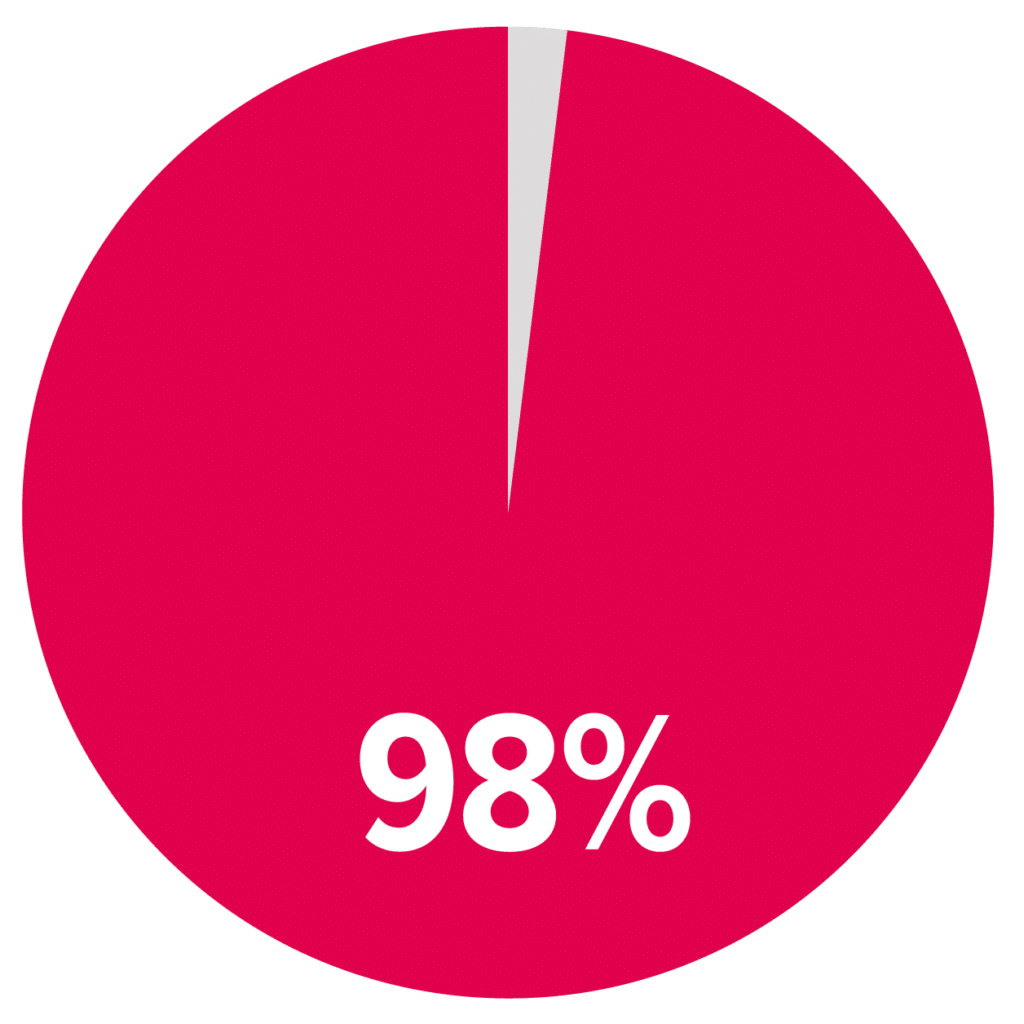
In 2022, 98% of educators surveyed in the North Dakota Network for Personalized Learning reported they feel more comfortable taking risks and trying new things.
Transforming education begins with empowering teachers.
We often talk about the need for a mindset shift when it comes to personalized learning, and that begins with how teachers see themselves.
“When you start having teachers visit each other, they might go into a PE class and see how PE teachers have been doing personalized learning for quite some time: they’re looking at skills, giving direct feedback. A peer can highlight that for you,” said Frazine. “They begin not to see themselves as just a PE teacher – they’re someone who is implementing things that are good for kids. They were already doing the work of personalizing learning and didn’t even realize it.”
The strength of small wins like these can’t be overstated. When educators are communicating openly with each other, they’re sharing the kinds of ideas, challenges and practices that build lasting relationships – and making sustainable changes that build the kinds of classrooms and schools where learners thrive.
This was written by former Senior Manager of Communications Jillian Kuhlmann.
